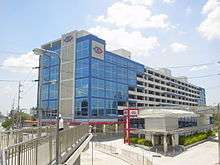Mass Rapid Transit Authority of Thailand
The Mass Rapid Transit Authority of Thailand (MRTA, Thai: การรถไฟฟ้าขนส่งมวลชนแห่งประเทศไทย) is a government agency under the Ministry of Transport of Thailand. It is responsible the operation of rapid transit systems in the Bangkok Metropolitan Region and including other provinces as defined by the royal decree. The MRTA was founded in 1992 and underwent restructuring in 2000.[1] The MRTA oversees the operation of the BTS outside Bangkok areas and MRT, which consists of the operational Blue Line and Purple Line. Other systems, including the Airport Rail Link, are owned and operated by other agencies.
 | |
 MRTA headquarters, Bangkok | |
| Transit authority overview | |
|---|---|
| Formed | 1992 |
| Jurisdiction | Thailand |
| Headquarters | Bangkok, Thailand |
| Parent department | Ministry of Transport |
| Website | mrta |
History
The Mass Rapid Transit Authority of Thailand was established in 1992 as the Metropolitan Rapid Transit Authority established under the Royal Decree Establishment of the Metropolitan Rapid Transit Authority B.E. 2535 which came into effect on 21 August 1992 with the objective of organizing mass transportation systems in Bangkok and its vicinity By electric train.[2][3]
Later it was issued The Mass Rapid Transit Authority of Thailand Act B.E. 2543, announced in the Government Gazette on 1 December 2000, therefore, changed its name to Mass Rapid Transit Authority of Thailand or MRTA.
The new Act also provides MRTA with many additional duties, such as the authority to designate the Safe Zone for protecting the tunnels and underground structures and the Metro System to protect the passengers and the electric train system efficiently. In addition to that, MRTA is able to find income other than passenger fares and can develop real estate as necessary for the benefit of the electric train service ad has the authority to operate the electric train business, In Bangkok and suburbs as well as may operate the electric train business in other provinces as the royal decree authorizes power as well.[4]
References
- "About MRTA: Background". MRTA website. Retrieved 1 January 2014.
- https://www.thairath.co.th/news/local/bangkok/1754066
- https://www.prachachat.net/property/news-413307
- http://www.mot.go.th/about.html?id=15

.svg.png)